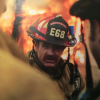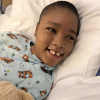When I was a kid, I remember standing in front of the schedule taped to our fridge, my eyes tracing the rows of tiny letters as I tried to figure out when I’d get to see my dad.

The words stared back at me — A shift, B shift, C shift — over and over. I knew that A & B shift days meant I would see my Dad. I would count and recount — 24 hours on, 48 hours off — until the day finally came when I could run straight into his arms.

When I was little, my dad was a hero to me. I imagined him charging into burning buildings with smoke swirling around him, carrying people to safety in his arms. I pictured him spraying a powerful fire hose, flames hissing and disappearing under the water.

But as I grew up, I started to see the truth. His job was so much bigger and heavier than what I had imagined. Firefighters don’t just battle flames — they respond to medical emergencies in the middle of the night, cut people out of twisted cars after crashes, and help those in the middle of a mental health crisis. They see the hardest moments of people’s lives, day after day.

For 34 years, my dad showed up to face all of it. When he first started, no one really talked about post-traumatic stress. People didn’t think about the fact that firefighters, like Veterans, carry the weight of the things they’ve seen. The National Institute of Mental Health (NIMH) defines PTS as a condition that can develop after experiencing or witnessing a traumatic event. Symptoms of PTS include flashbacks, avoidance of reminders, negative changes in emotions and behaviors and hyperarousal.The International Association of Firefighters reports that as many as one-third of firefighters and emergency medical responders experience symptoms of post-traumatic stress.
The Oregon Fire Service Health and Safety Collaboration states that firefighters are at greater risk of post-traumatic stress because of their repeated exposure to traumatic events. They often face the cumulative weight of multiple emergencies — sometimes all in a single shift — and the impact can be profound.

What surprised me most about being part of a firefighter’s family is that the job doesn’t end when the shift ends. Being a firefighter isn’t just a career — it’s an identity. It’s woven into who my dad is and has shaped the man he became.

I remember one story he told me that I will never forget. He was leaving a concert in downtown Portland one night when a deafening bang shook the entire sidewalk. When he turned, he saw a car wrapped around a pole. Inside was a young girl slumped over the wheel.
As a firefighter, you can’t turn away in those moments, so my dad ran toward the car and reached her first. He quickly saw the extent of her injuries and in that moment — as both a firefighter and a father — he did what he would hope someone would do if it were one of his daughters. He gently cradled her head in his hands and stayed with her, watching as she took her last breath and left this world for another.
It’s moments like that — both on and off the job — that leave a lasting mark on our first responders. The trauma they carry doesn’t just live within their A, B, or C shifts. They don’t stop being firefighters when they hang up their gear. They chose this work because they want to help people — and that instinct never shuts off.
In the article Understanding Firefighter PTSD and How Departments Can Support Their Crews, Matt Rowley (Columbia Southern University) explains that one of the best ways to help prevent PTS in firefighters is to get rid of the stigma around having emotional reactions to tough calls. The National Fallen Firefighters Foundation even made behavioral health one of its 16 Firefighter Life Safety Initiatives, encouraging departments to offer counseling and mental health support for firefighters and their families since everyone handles trauma differently. Rowley also points out that programs like the NFFF’s ACT program (“Ask. Care. Take.”) can make a big difference by teaching firefighters to check in on each other and recognize when someone might be struggling.

Firefighters—like my dad—pour their hearts and souls into the job. Whether it’s on the A, B, or C shift, they are always ready to put their lives on the line to save someone else’s. That kind of commitment comes with real sacrifices, and that’s why Chive Charities’ feels so strongly about supporting firefighters both on and off the job. It’s more than just appreciation—it’s a way to honor their courage and show them how much their service truly means.
This October 10th—Team 10 Percent Day—we rally together for heroes like my dad. Every dollar raised supports first responders, Veterans, and families facing their toughest battles.
Because when we show up #ForTheOne, we change everything.
Stand with us #ForTheOne. Fundraise, share and join Team 10 Percent Day.









































































































































































-3__small.jpg)












































































































__small.jpg)










__small.jpg)






















































































_with_flag,_jason__emily_rowley-4__small.jpg)

































































































































-2__small.jpg)


























































































































































